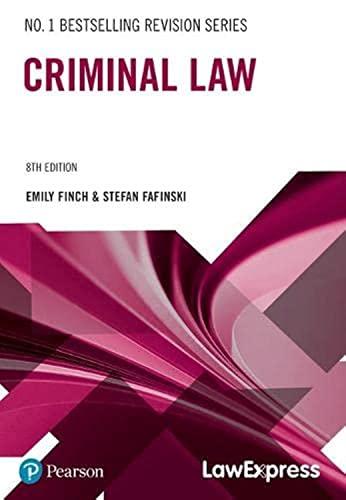Question
1. It refers to the nature of a corporation that has something to do with the continuation of its corporate existence despite changes in ownership
1. It refers to the nature of a corporation that has something to do with the continuation of its corporate existence despite changes in ownership and management.
- Liquidation
- Inheritance
- Succession
- Dissolution
2. The extent of liability of those who compose a corporation by estoppel.
- Stockholder
- Creditor
- Limited Partners
- General Partners
3. It is the general law in accordance with which corporations are expected to be legally organized and granted juridical personality.
- Securities Regulations Code
- The Revised Corporation Code
- Corporate Charter
- All of the above
4. It is the governing body in a stock corporation.
- Corporators
- Board of Directors
- Board of Trustees
- Incorporators
5. It asserts that subscriptions to the capital stock of a corporation constitute a fund to which the creditors have a right to look for the satisfaction of their claims.
- Doctrine of Corporate Entity
- Trust Fund Doctrine
- Doctrine of Corporate Opportunity
- None of the above
6. It is the maximum amount fixed in the articles of incorporation that may be subscribed and paid by the stockholders of the corporation.
- Outstanding capital stock
- Authorized capital stock
- Paid-up capital stock
- None of the above
7. The following are the requirements before one can qualify as a de facto corporation, except:
- The existence of a valid law under which it may be incorporated.
- An attempt in good faith to incorporate
- Assumption of corporate powers
- None of the above
8. A corporation's governing power is legally allowed to, except:
- Exercise all the power granted to a corporation under the Corporation Code
- Govern the day-to-day business of the corporation
- Manage all the properties of the corporation
- None of the above
9. An executive committee in a corporation may not exercise the following powers, except:
- Approval of actions that are left to the discretion of the stockholder or members
- Filling up of vacancies in the board
- Adoption and repeal of by-laws
- Amendment or repeal of any resolution of the board
10. It is an action brought by a stockholder on behalf of the corporation to enforce corporate rights against the directors or trustees and stockholders or members.
- Class suit
- Derivative suit
- Individual Suit
- Corporate suit
11. It is exercised by a stockholder who objects to a proposed corporate action by opting to withdraw from the corporation by demanding payment of the fair market value of his shares.
- Pre-emptive right
- Appraisal right
- Stockholder's right
- Proprietary right
12. The following are the requirements for the increase or decrease of authorized capital stock, except:
- It shall not prejudice corporate creditors.
- It must be approved by a majority of the directors.
- It must be ratified by 2/3 of the holders of outstanding capital stock.
- It must be approved by the Banko Central ng Pilipinas.
13. It is otherwise referred to as the right of first refusal over newly issued shares of stock which is conferred on the stockholders of the corporation.
- Appraisal right
- Right to vote
- Pre-emptive right
- Proprietary right
14. These are corporate profits which are earmarked for distribution to the stockholders at a fixed time.
- Income
- Revenue
- Surplus
- Dividends
15. It is an agreement whereby a corporation delegates the management of its affairs to another corporation for specific period of time.
- Management contract
- Voting trust agreement
- Contract of agency
- Plan of consolidation
16. It is otherwise referred to as the charter of a corporation.
- Articles of incorporation
- By-laws
- Corporate rules and regulations
- None of the above
17. A private corporation may provide the following in its bylaws, except:
- The manner of calling a meeting of directors or trustees
- The manner of voting during a meeting of stockholders or members
- The manner for the appointment or election of corporate officers
- All of the above
18. The following are the characteristics of a voting trust agreement, except:
- It could only be enforced for a period of not exceeding five years at any one.
- The rights it confers are as a rule, not revocable for a definite period of time.
- It is intended to ensure voting control in a corporation.
- All of the above.
19. The following are the requirements for board meetings, except:
- The meeting shall take place with the directors or trustees assembled as members of a collegial body.
- The quorum shall be determined based on the rules indicated in the bylaws of the corporation.
- As a rule, the directors and trustees decide during a meeting based on the majority position.
- The meetings are held, as a rule, at the residence of the corporation.
20. It is the book which records the names and addresses of all stockholders arranged alphabetically, the installments paid and unpaid on all the stock for which subscription has been made and the date of payment thereof.
- Accounting ledgers
- Corporate journals
- Minutes of the meetings
Stock and transfer book
Step by Step Solution
There are 3 Steps involved in it
Step: 1

Get Instant Access to Expert-Tailored Solutions
See step-by-step solutions with expert insights and AI powered tools for academic success
Step: 2

Step: 3

Ace Your Homework with AI
Get the answers you need in no time with our AI-driven, step-by-step assistance
Get Started


